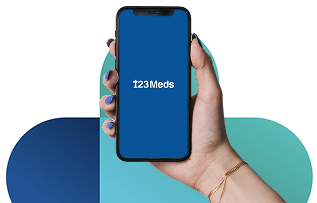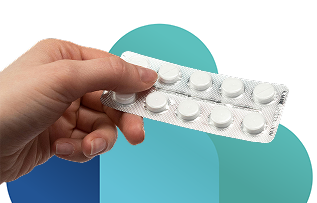Fungal Skin Infection
Fungal skin infections, such as athlete’s foot or ringworm, can cause itchy, red, or flaky patches on the skin. While often not serious, early treatment can relieve discomfort and prevent the infection from spreading.
We offer a range of clinician-approved topical and oral treatments to help clear the infection, reduce irritation, and support skin health. Simple hygiene measures can also help speed recovery and minimise the risk of recurrence.
Through 123Meds, you can receive expert-approved treatments for fungal skin infections via our UK-registered online pharmacy service, with prescriptions reviewed by clinicians and delivered discreetly straight to your door.

pharmacists

consultations & orders

delivery before 3:30PM

Available Now
Fungal skin infections are very common. They occur when fungi grow on the skin, usually in warm and moist areas. These infections can cause itching, redness, scaling, or a rash that spreads. They are not usually dangerous, but they can be uncomfortable and sometimes come back if not fully treated.
The most common fungal skin infections we treat are athlete’s foot, jock itch, and intertrigo. Athlete’s foot affects the skin between the toes and on the feet, jock itch causes a rash in the groin and inner thighs, while intertrigo is an irritation that appears in skin folds such as under the breasts, between abdominal folds, or in the groin.
Fungi naturally live on the skin, but they can multiply when conditions allow, particularly in warm, damp, or sweaty environments. Wearing tight clothing, walking barefoot in communal showers, or sharing towels can increase the chance of infection.
Athlete’s foot and jock itch are usually caused by dermatophyte fungi that thrive in moist areas of the body. Intertrigo, on the other hand, is linked to friction and moisture in skin folds and is often worsened by yeast such as Candida.
The symptoms depend on which part of the body is affected.
Athlete’s foot usually causes itching, stinging, cracked or peeling skin between the toes, and sometimes scaling on the soles of the feet.
Jock itch tends to appear as a red, itchy rash in the groin or upper thighs that may spread outward in a ring shape.
Intertrigo causes redness, soreness, and sometimes a raw or weeping rash in areas where skin folds rub together.
These areas may feel itchy or painful. You should seek medical advice if a rash is spreading quickly, very painful, associated with fever, or producing pus. It is also important to see your GP if the infection affects the nails or scalp, as these need different types of treatment.
Most fungal skin infections are treated with antifungal creams, sprays, or powders. These medicines work by killing the fungi and preventing them from spreading. Treatment usually needs to be continued for at least two weeks, even if the skin looks better, to make sure the infection is completely cleared. Good self-care is just as important as treatment.
Keeping the affected area clean and dry, changing socks and underwear daily, avoiding sharing towels, and wearing loose-fitting cotton clothing can help prevent the infection from coming back.
For intertrigo, gently cleansing and keeping skin folds dry, sometimes with barrier creams, can reduce irritation and lower the chance of recurrence.
Our service can provide antifungal treatments such as creams for uncomplicated fungal skin infections, including athlete’s foot, jock itch, and intertrigo. Always read the patient information leaflet that comes with your medicine.
If your symptoms do not improve with treatment, or if you develop spreading redness, swelling, fever, or chills, you should seek further advice from NHS 111 or your GP. For sudden or severe symptoms, you should go to A&E.
What is a fungal skin infection?
A fungal skin infection is caused by fungi that grow on the skin, nails, or scalp. These infections thrive in warm, moist environments and are common in areas like the feet, groin, and underarms.
What are the symptoms?
Common symptoms include red, itchy, or flaky skin, a ring-shaped rash, peeling or cracking skin, and discomfort. Nail infections may cause thick, brittle, or discoloured nails.
What causes fungal infections?
They are usually caused by direct skin contact, sweating, wearing tight clothing, poor hygiene, or walking barefoot in communal areas. They can also spread through shared towels or shoes.
Are fungal infections contagious?
Yes. Fungal infections can spread through skin contact, shared items, or contaminated surfaces. It’s important not to share towels, shoes, or razors and to treat infections promptly.
How are they treated?
Most infections can be treated with antifungal creams, sprays, or powders. More severe cases may need oral antifungal tablets. It’s important to continue treatment for the full recommended time, even if symptoms improve.
How long does treatment take?
Treatment usually lasts 2 to 6 weeks, depending on the type and severity of the infection. Nail infections can take longer to clear.
Can fungal infections come back?
Yes, reinfection is common, especially if the area stays moist or hygiene habits don’t change. Keeping skin clean and dry and wearing breathable fabrics can help prevent recurrence.
Should I see a doctor?
See your GP if the infection doesn’t improve with treatment, worsens, keeps coming back, or if you have underlying conditions like diabetes or a weakened immune system.
Can children get fungal infections?
Yes, fungal skin infections can affect people of all ages, including children. Treatments are usually safe for children over 2 years of age—check the label or consult a pharmacist or GP.
Fill out a quick form!
Fast, safe online consultations – no need to visit a GP or pharmacy.

Select your medication
Once you’ve completed the assessment, we’ll show you treatments that are right for you.

Prescriber review
Our prescribers will review your consultation and, if it's right for you, send a prescription to our pharmacy.

Express Delivery
Discreet delivery straight to your door, as soon as the next day.

Our 5-Point Safety Guarantee
We focus on trust, privacy, and expert service in online medication ordering.
GPHC and MHRA Regulated Pharmacy
Regulated by all necessary UK regulatory bodies
UK qualified Pharmacists
All consultations reviewed by UK pharmacists
Authentic Medication
Sourced from approved suppliers only
Customer Care
Customer care team available via email or phone
Trusted by Thousands
Thousands of satisfied customers

pharmacists

consultations & orders

delivery before 3:30PM

Available Now

